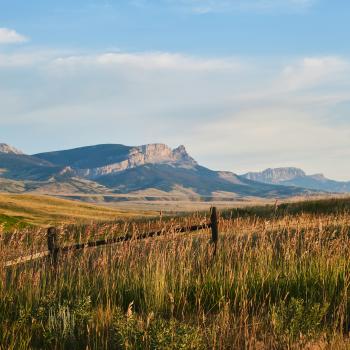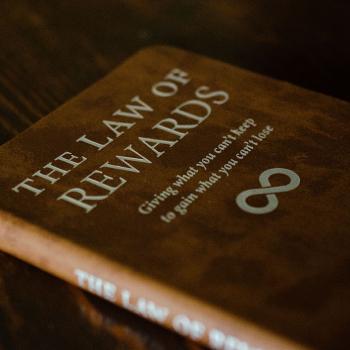By Matthew Potts - June 3, 2009
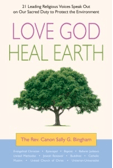 As the world seems almost literally to crumble around us, it's easy to lose heart. Temperatures and oceans are becoming more elevated; weather patterns and conflicts over resources are becoming more violent; oil and water are becoming more scarce. But for those who hold a little confidence in human resolve and a bit more faith in God's good grace, hope for a solution to our environmental challenges still remains. And if the recent bevy of books and websites is any proof, a lot of people - some of them quite talented and all of them very determined - are everyday doing their level best on behalf of God's green earth. Among all the potential resources, though, it's hard to know what's worth reading and what can be missed. This short article aims to provide a round-up of resources both in print and online for those hoping to cultivate some Christian creation care.
As the world seems almost literally to crumble around us, it's easy to lose heart. Temperatures and oceans are becoming more elevated; weather patterns and conflicts over resources are becoming more violent; oil and water are becoming more scarce. But for those who hold a little confidence in human resolve and a bit more faith in God's good grace, hope for a solution to our environmental challenges still remains. And if the recent bevy of books and websites is any proof, a lot of people - some of them quite talented and all of them very determined - are everyday doing their level best on behalf of God's green earth. Among all the potential resources, though, it's hard to know what's worth reading and what can be missed. This short article aims to provide a round-up of resources both in print and online for those hoping to cultivate some Christian creation care.
A quick search on Amazon will reveal anywhere from one to two thousand titles on the topic of Christian environmentalism, depending on your search terms. But a few recent titles stand out not only for their timeliness, but also for the value and vision of their contributions. The Rev. Sally Bingham is Environmental Minister for the Episcopal Diocese of California. In February of this year, she released a book, Love God Heal Earth (St. Lynn's Press, $17.95), which compiles reflections upon and responses to the environmental crisis from across the religious spectrum. Included are essays and anecdotes from both Catholics and evangelicals, Muslims and Jews, Buddhists and Unitarians. The volume is notable not only for the breadth of the compilation, but also for the singular note of hope it so diversely strikes.
A similar book is the volume edited by Lindsay Mosely, Holy Ground: A Gathering of Voices on Caring for 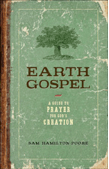 Creation (Sierra Club/Counterpoint, $22). Holy Ground boasts a format similar to that of Love God Heal Earth and some renowned contributors, too, including Ecumenical Patriarch Bartholomew, Pope Benedict XVI, and Wendell Berry. Both books are wonderful introductions to the interfaith impetus for creation care.
Creation (Sierra Club/Counterpoint, $22). Holy Ground boasts a format similar to that of Love God Heal Earth and some renowned contributors, too, including Ecumenical Patriarch Bartholomew, Pope Benedict XVI, and Wendell Berry. Both books are wonderful introductions to the interfaith impetus for creation care.
For those less interested in what religious leaders are saying and more concerned with what everyday Christians could be doing, two other recent publications offer good options. J Matthew Sleeth's Serve God, Save the Planet: A Christian Call to Action (Zondervan, $14.99) offers everyday solutions from the perspective of the author, a medical doctor who writes from a somewhat evangelical perspective. As such, both scripture and science surface here, and even if some might complain this book lacks something of rigor or vision, for scripturally interested Christians newly interested in protecting creation, this will be a good introduction.
From the other end of the Christian tradition comes Care for Creation: A Franciscan Spirituality of the Earth (St. Anthony Messenger Press, $18.95), by Keith Douglass Warner, OFM, Ilia Delio, OSF, and Pamela Wood. These collaborators pool their talents (Warner is a lecturer in environmental studies, Delio a professor of spirituality, and Wood a therapist and retreat leader) to identify environmental concerns, meditate upon them, and then make recommendations for both spiritual and practical responses.
A final book that continues the spiritual interests of Care for Creation deserves mention. Sam Hamilton-Poore's new Earth Gospel: A Guide to Prayer for God's Creation (Upper Room, $18) presents a four-week course of spiritual practice arranged around seven themes with respect to the earth: Beginnings, Providence, Wisdom, Vocation, Sin, Recreation, and Sabbath. It weaves together prayer, reflection, scripture, and practical recommendations in an eloquent and careful plan for devotion.
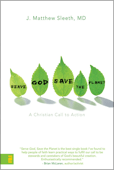 If an Amazon search yields unmanageable results, a Google search is simply overwhelming. As with most issues, the web is full of sites both profoundly helpful and desperately unhelpful, all of which boast authority on the topic at hand. A few sites, however, are indispensible for the environmentally concerned Christian. The National Council of Churches Eco-Justice Programs website (www.nccecojustice.org) houses nearly limitless resources within its electronic walls. From Bible studies to course curricula to issue advocacy to action plans, the NCC Eco-Justice website is a necessity for any Christian hoping to become involved, or to get one's church involved, in work toward the restoration of creation.
If an Amazon search yields unmanageable results, a Google search is simply overwhelming. As with most issues, the web is full of sites both profoundly helpful and desperately unhelpful, all of which boast authority on the topic at hand. A few sites, however, are indispensible for the environmentally concerned Christian. The National Council of Churches Eco-Justice Programs website (www.nccecojustice.org) houses nearly limitless resources within its electronic walls. From Bible studies to course curricula to issue advocacy to action plans, the NCC Eco-Justice website is a necessity for any Christian hoping to become involved, or to get one's church involved, in work toward the restoration of creation.
